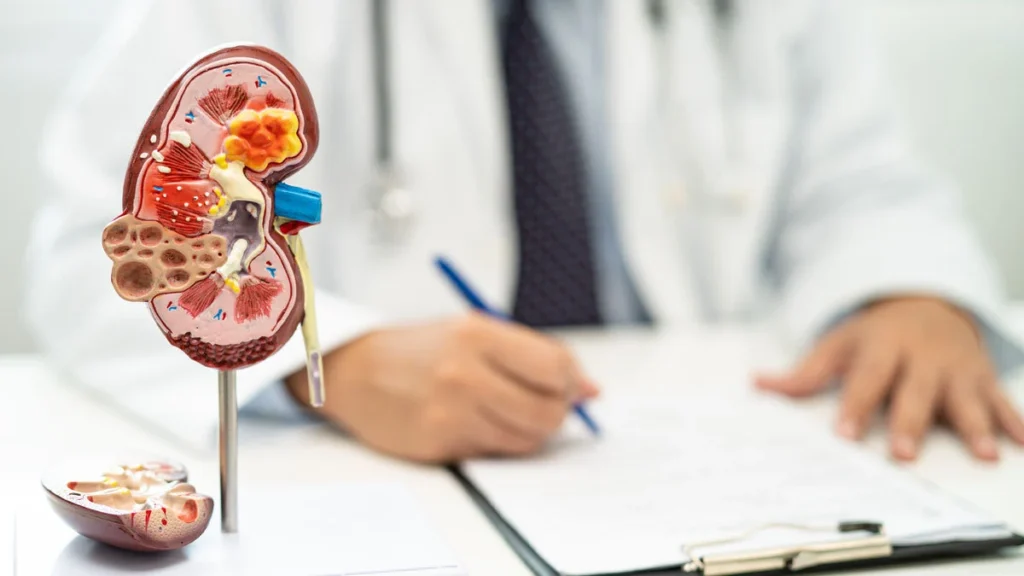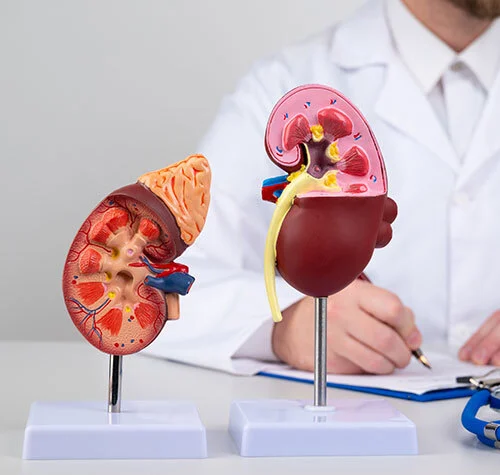
Kidney Stones: Symptoms, Causes, Treatment
Kidney stones might be one of the most shockingly painful experiences our bodies can deal with, don’t you think? One minute you are going about your daily routine, blissfully unaware of anything wrong within your inner system. Next, it feels like your body has declared a rebellious war against your tender internal organs.
Kidney stones are definitely one of those health situations where an ounce of prevention is worth an infinite tonnage of cure. That’s why having proper knowledge of symptoms, causes, prevention, and kidney stone treatment is essential. Because as acute as the passage might be, those debilitating episodic flare-ups could potentially hint at even more severe chronic kidney issues festering beneath the surface too.
Table of Contents
ToggleWhat are Kidney Stones
Kidney stones are solid crystallized mineral deposits that accumulate into rigid stone-like masses inside the kidneys or urinary tract when certain bodily factors reach extreme supersaturation levels. Different compositional types of kidney stones exist depending on the specific mineral ingredients involved:
- Calcium Stones: These make up a whopping 80% of all cases and arise when calcium oxalate or phosphate binds together.
- Uric Acid Stones: These happen when uric acid levels get overly concentrated, failing to properly dissolve.
- Struvite Stones: Certain bacterial infections can spark formations of struvite ammonia crystals gumming up the works.
- Cystine Stones: A hereditary disorder that causes too much of the cystine compound to accumulate.
No matter their elemental makeup, all kidney stones share the same basic formation drivers: Excessive insoluble minerals build up from either too much excretion or not enough hydration to sufficiently regulate them. A perfect storm of bodily conditions allows those rock-hard crystal deposits to merge and grow into burdensome, exquisitely jagged little razors within your urinary system over time.
Usually ranging from granular sand-like particles to larger pea-sized masses (although basically monumental as far as your bladder’s concerned), these uncompromising calculi conspire to wage outright internal war as they forcefully attempt the passage. Cue the chills, vomiting, cold sweats, and overwhelming urge to commit unspeakable atrocities to simply end the pain.
Symptoms Of Kidney Stones
Since kidney stones are mostly asymptomatic while congealing maliciously in their lithogenic dens, the first clue they’re sharpening their knives often comes in the form of feeling like you’re straight-up dying.
More specifically, the suddenly excruciating signs kidney stones have decided to descend towards your personal Lower Earth Realm include:
- Intense, debilitating pain radiating outward from your back/side
- The groin and lower abdomen area hurts so much you want to invert yourself
- Persistently feeling an inexplicable need to urinate…yet can’t
- Bright pink or reddish-brown urine indicating blood and mineral presence
- Burning sensations or sharp pains while actually trying to pee
- Cold sweats, chills, fever, nausea, and vomiting from the crippling discomfort
If you’re experiencing any of those symptoms, schedule an appointment with Dr. Maninder Singh Randhawa, who is one of the Best Urologist in Mohali.

Common causes of kidney stones
While some cases are inextricably linked to genetics and pre-existing medical conditions, most experts overwhelmingly point to diet and lifestyle as the primary culprits seeding these crystalline saboteurs.
A few of the most common kidney stone instigators include:
- Not drinking enough water (dehydrated metabolic waste buildup)
- Excessive protein and sodium intake straining the kidneys
- Vitamin/mineral imbalances like too much D, too little citrate
- Obesity, gut issues, and chronic inflammatory conditions
- Highly concentrated or acidic urine allowing salts to solidify
At the end of the day, your kidneys are valiantly trying to properly filter and eliminate metabolic waste 24/7. Clogging their delicate tubing with excessive amounts of sludgy residue is just begging for indiscriminate crystallization and stone development.
This is why preventing future stone formations and attacks is all about promoting healthy hydration, balanced nutrition, and flushing those kidneys nice and clean on the regular.
Some prudent stone prevention tactics include:
- Drinking way more water (3+ liters daily) to continuously dilute urine
- Reducing sodium intake and processed meats/fish in favor of plants
- Getting sufficient magnesium, citric acid, and stone-inhibiting nutrients
- Losing weight and managing any inflammatory conditions holistically
- Regular exercise and stress management to optimize kidney function
Kidney Stone Treatment – Hale Clinics
But for those of you already encountered an active stone event, don’t hesitate to schedule an appointment at Hale Clinics, which provides one of the best Kidney Stone Treatment in Mohali.
Depending on factors like size and positioning, treatment options could range from simply increasing water intake and providing pain relievers…to percutaneous surgery or even sound wave dissolution if the stones prove too obstinate.
Even after successfully defusing one harrowing kidney stone scare, your personal war on crystalline terror may be just beginning. While no consolation amidst the first white-hot onslaught of pain, having formed a single stone dramatically increases your risk of developing repeat encore performances.
That’s why the urology experts at Hale Clinics take such a proactive, holistic approach in prescribing personalized diet adjustments, lifestyle remedies, medications like alpha-blockers, and preventative surgeries for higher-risk patients. Being literally shredded by one kidney stone experience is already traumatic enough – their mission involves arming you against any future attacks.
Conclusion
While passing a kidney stone is indeed one of life’s most exquisite tortures, it doesn’t have to represent an inescapable cyclical hell. So next time you feel an unfamiliar pang suspiciously radiating from your lower back, don’t just take it lightly and get proper kidney stone treatment provided by Hale Clinics. Listen to your body’s cries, heed any early warning signs, and don’t be afraid to call for qualified medical backup. Because an ounce of kidney stone prevention is truly worth an infinite tonnage of cure against their exquisitely excruciating exploitation tactics.
FAQs
Q1. What are kidney stones?
Ans. Kidney stones are solid crystallized mineral deposits that accumulate into rigid stone-like masses inside the kidneys or urinary tract. They can be composed of calcium, uric acid, struvite, or cystine.
Q2. What are the symptoms of kidney stones?
Ans. Symptoms include intense pain radiating from the back/side to the groin, persistent urge to urinate but inability to do so, blood in urine, burning sensations while urinating, nausea, vomiting, chills, and fever.
Q3. What causes kidney stones?
Ans. Common causes include not drinking enough water, excessive protein and sodium intake, vitamin/mineral imbalances, obesity, gut issues, chronic inflammation, and highly concentrated or acidic urine.
Q4. How can kidney stones be prevented?
Ans. Prevention tactics involve drinking plenty of water, reducing sodium and processed meats, getting sufficient magnesium/citric acid, losing weight, managing inflammatory conditions, regular exercise, and stress management.
Q5. What are the treatment options for kidney stones?
Ans. Treatment depends on size and positioning but can range from increased water intake and pain relievers to percutaneous surgery or sound wave dissolution for stubborn stones.
Q6.Where can I get kidney stone treatment in Mohali?
Ans. Hale Clinics provides one of the best kidney stone treatments in Mohali, with a proactive and holistic approach including diet adjustments, lifestyle remedies, medications, and preventative surgeries.
